SIBO: Symptoms, Causes and Natural Support Strategies
Small intestinal bacterial overgrowth (SIBO) is a condition that is characterized by too many microorganisms in the small intestine. Unlike the large intestine or colon, which is extraordinarily rich in bacteria, the small intestine usually has much fewer bacterial organisms.
The small intestine typically has less than 104 organisms per milliliter. Anything above this level is classically considered to be SIBO (1). This bacterial overgrowth can be a combination of both good (progenic) and bad (pathogenic) microorganisms.
SIBO damages the intestinal lining and creates a state of mild-severe leaky gut syndrome resulting in food allergies, sensitivities, and chronic inflammatory processes (2). It is imperative to get proper help through good nutrition and lifestyle and the help of a functional nutrition practitioner.
Small Intestinal Microbiome:
The duodenum and proximal jejunum normally contain small numbers of bacteria, usually lactobacilli and enterococci, gram-positive aerobes, or facultative anaerobes. Coliforms may be transiently present (< 103 bacteria per mL) and anaerobic Bacteroides are not found in the jejunum in healthy people (3).
The distal ileum is a transition zone between sparse populations of aerobic bacteria in the proximal small intestine and very dense populations of anaerobic microorganisms in the large bowel. Any imbalance or increase in the amount of bacteria in the jejunum and ileum is considered SIBO (4).
SIBO leads to both maldigestion and malabsorption as the bacteria interfere with the normal enzymatic and metabolic activity of the small intestine. Additionally, these bacteria are associated with increased serum endotoxin and bacterial compounds stimulating the production of (pro)inflammatory cytokines (5)
Iron is typically absorbed in the duodenum and the jejunum and SIBO can interfere with this absorption resulting in microcytic anemia. Vitamin B12 is absorbed in the ileum and patients with SIBO often have B12 malabsorption which leads to megaloblastic anemia and B12 deficiency (6).
10 Symptoms Often Seen with SIBO
1. Gas
2. Bloating
3. Diarrhea &/or Constipation (less common than diarrhea)
4. Abdominal pain or cramping
5. Skin disorders such as eczema and rosacea
6. Diagnosis of irritable bowel syndrome or inflammatory bowel disease
7. Food intolerances such as gluten, casein, lactose, fructose, and more
8. Chronic illnesses such as fibromyalgia, chronic fatigue syndrome, autoimmune diseases, diabetes, and neuromuscular disorders.
9. B12 deficiency as well as other vitamins and minerals (iron and magnesium are common)
10. Fat malabsorption
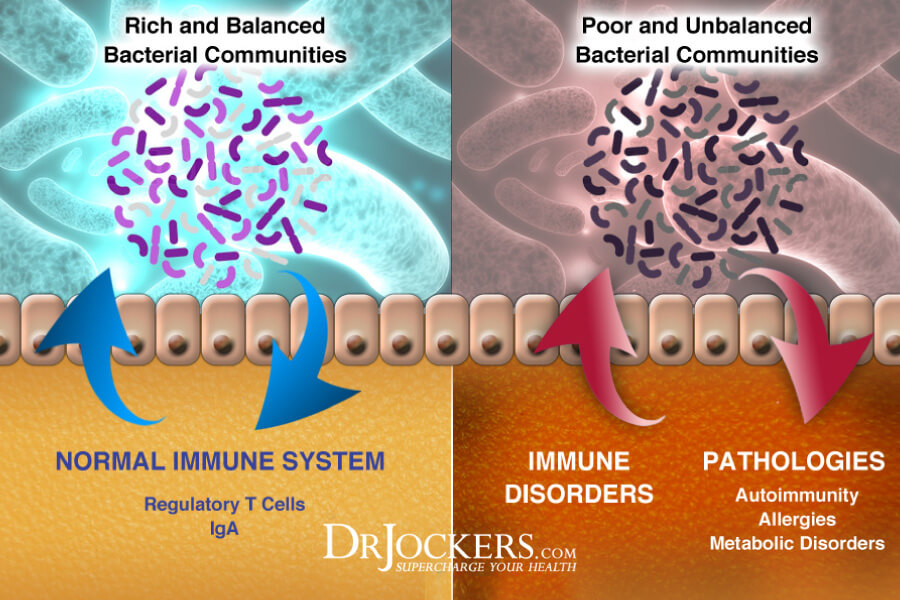
SIBO Symptoms and Conditions:
Individuals with SIBO will often experience abdominal pain, nausea, gas, bloating, belching, flatulence, chronic constipation, or diarrhea. The sheer number of microorganisms and the metabolic waste they produce through their life cycle can be very challenging to the body. As the metabolic waste is released it causes the build-up of methane and sulfur-based gases that produce bloating, gas, and flatulence (5).
Many physicians now believe that irritable bowel syndrome which has always had a loose definition is now better understood as SIBO (5, 6). SIBO is also known to be associated with Celiac disease, fibromyalgia, autoimmune conditions, rosacea, liver problems, gallstones, and gastritis.
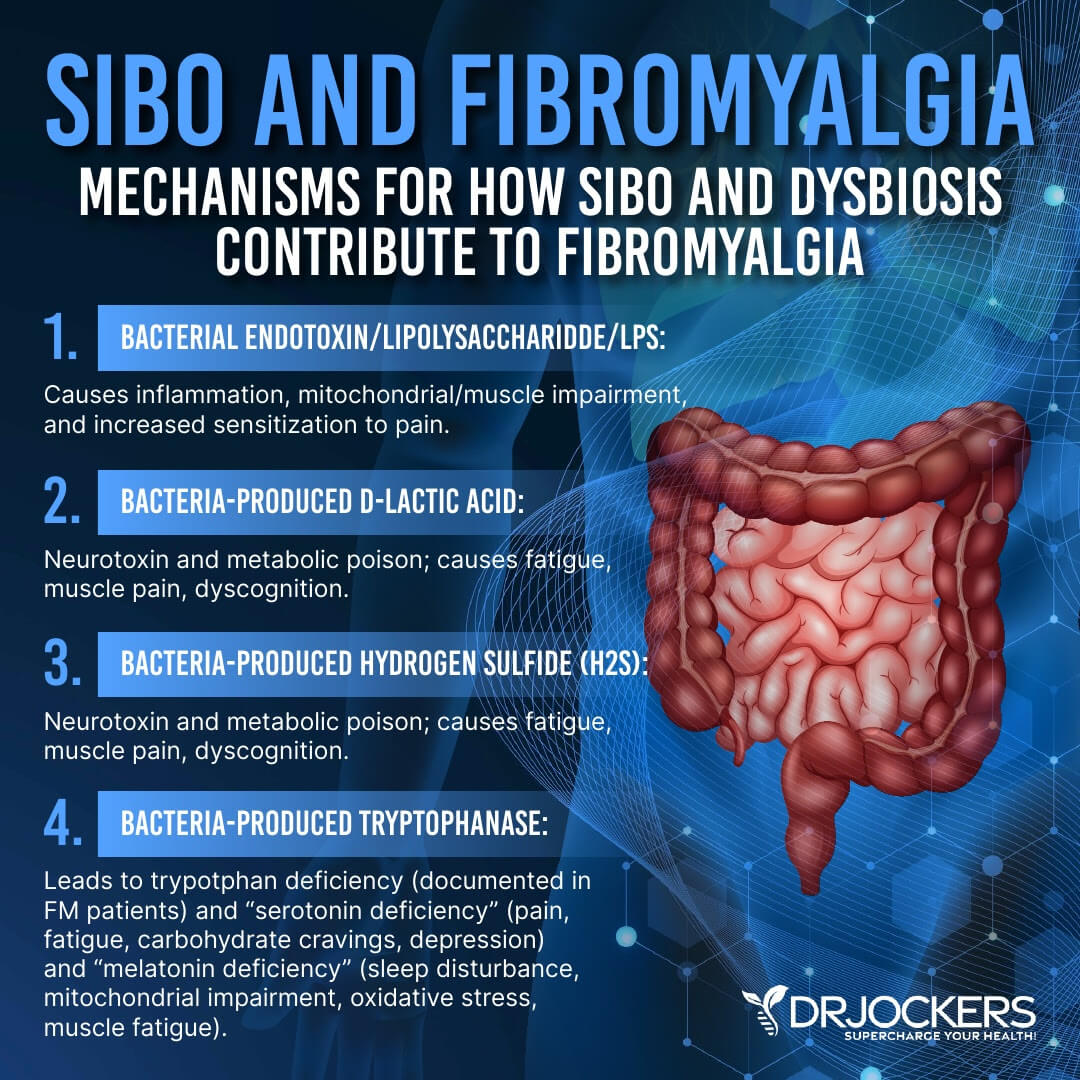
Why Symptoms Can Range:
In addition to the absolute number of organisms, the type of microbial flora present plays an important role in the manifestation of signs and symptoms of overgrowth (7). For example, a predominance of bacteria that metabolize bile salts to unconjugated or insoluble compounds may lead to fat malabsorption or bile acid diarrhea.
In contrast, microorganisms that preferentially metabolize carbohydrates to short-chain fatty acids and gas may produce bloating without diarrhea because the metabolic products can be absorbed. Gram-negative coliforms, such as Klebsiella species, may produce toxins that damage the mucosa, interfering with absorptive function and causing leaky gut syndrome.
How Does SIBO Develop:
SIBO develops when the normal homeostatic mechanisms that control intestinal bacterial populations are disrupted. There are several processes that most commonly predispose to bacterial overgrowth with the two most common being diminished stomach acid secretion and lack of small intestine motility (8).
1) Diminished Stomach Acid:
When one has low stomach acid it leads to inadequate digestion in the stomach. Stomach acid is necessary for protein digestion and to reduce bacteria levels from the food ingested. Low stomach acid leads to incomplete digestion and larger bacterial loads getting into the small intestine from the stomach (8).
Now, large protein molecules make their way into the small intestine where the pancreas has to pump tremendous amounts of enzymes out to attempt to metabolize these large particles. Over time, this leads to pancreatic insufficiency and overall poor digestive function.
The combination of increased bacterial loads making it through the normally low-pH environments of the stomach and into the small intestine along with poor digestion leads to an environment for bacterial overgrowth in the small intestine (9).
Additionally, taking proton pump inhibitors for acid reflux further worsens the pH environment of the stomach and creates the pathogenesis just described for the development of SIBO. Long-term use of PPIs is a red flag risk factor for the development of SIBO (10).
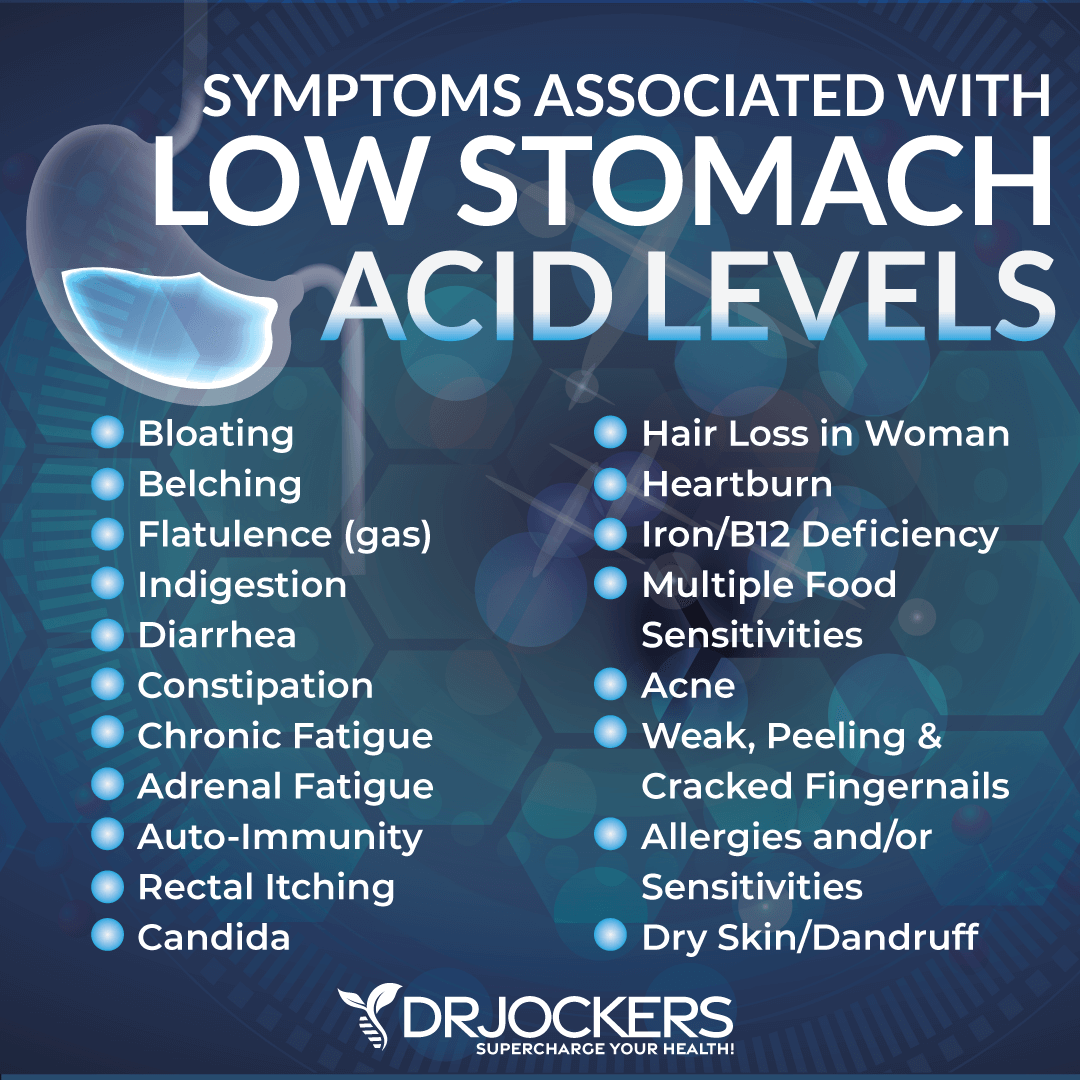
2) Poor Gut Motility:
Our gut relies on nerves, muscles, enzymes, and neurotransmitters to properly digest food. While enzymes mainly break down our food, the nerves, muscles, and neurotransmitters physically move the food through our digestive tract from the stomach to the small intestine and the colon.
When this happens in a healthy gut, bacteria get passed through the digestive tract along with the food to its final destination in the colon. Problems arise when motility is slow. This leads to food being stuck in the small and large intestine where it ferments and creates a breeding ground for bacteria. This is a ripe environment for the development of SIBO (11, 12).
The ileocecal valve is what separates the large and small intestine. In conditions with slow motility, this valve can get weak or held open by feces which allows for bacteria to translocate from the large to the small intestine (13). Improving gut motility is of utmost importance in preventing and correcting SIBO.
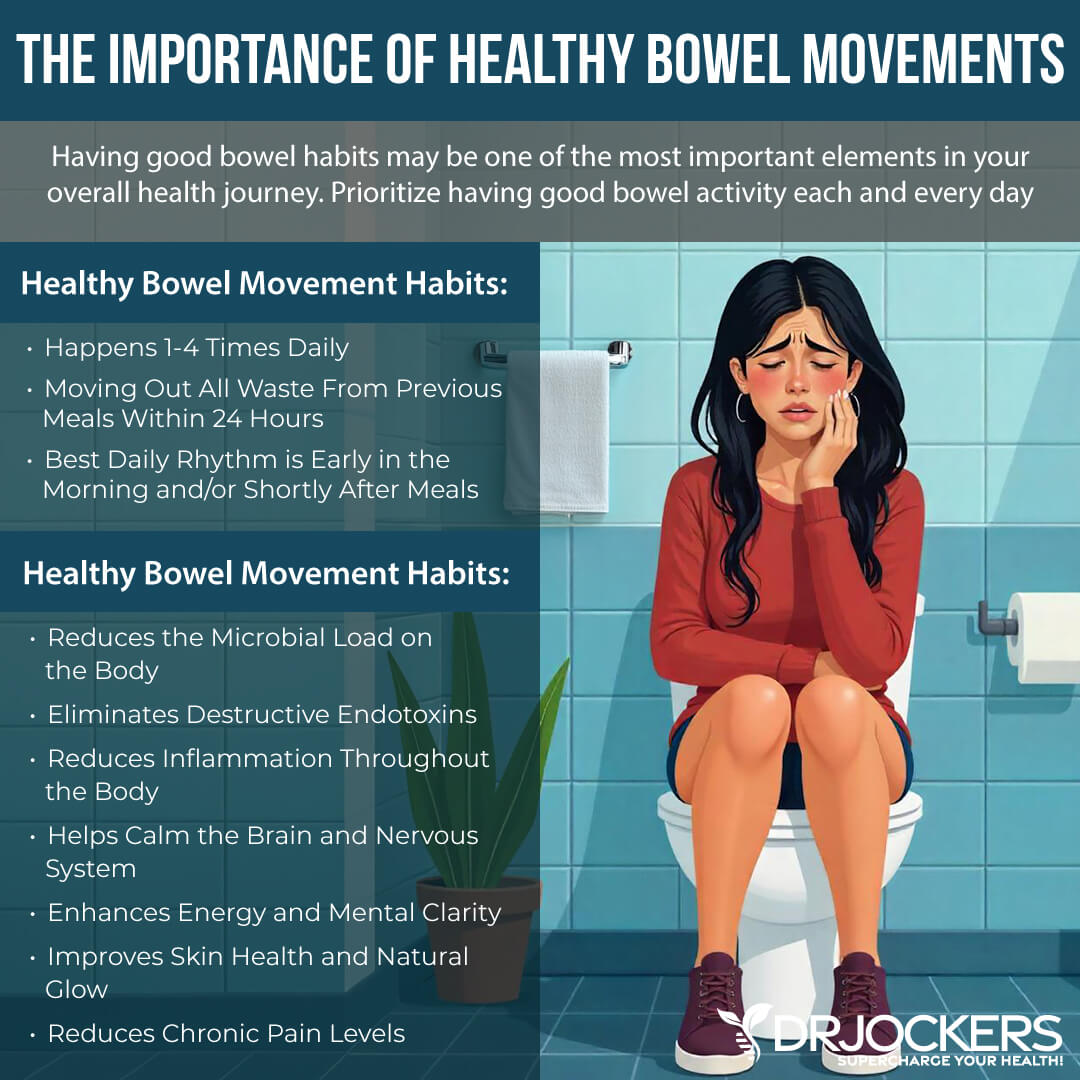
3) Intestinal Neuropathy:
Damage to the nerves or muscles in the gut can result in leftover bacteria in the small intestine, increasing your risk for SIBO. This can happen with diabetes, scleroderma, or serious trauma.
4) Physical Obstructions:
Physical obstructions in the gut, like scarring from surgeries or Crohn’s disease, can also cause an abnormal buildup of bacteria in the small intestine.
5) Diverticuli:
Diverticuli, which are tiny pouches that can form in the wall of the small intestine, can also collect bacteria instead of passing it on to the colon, where it belongs.
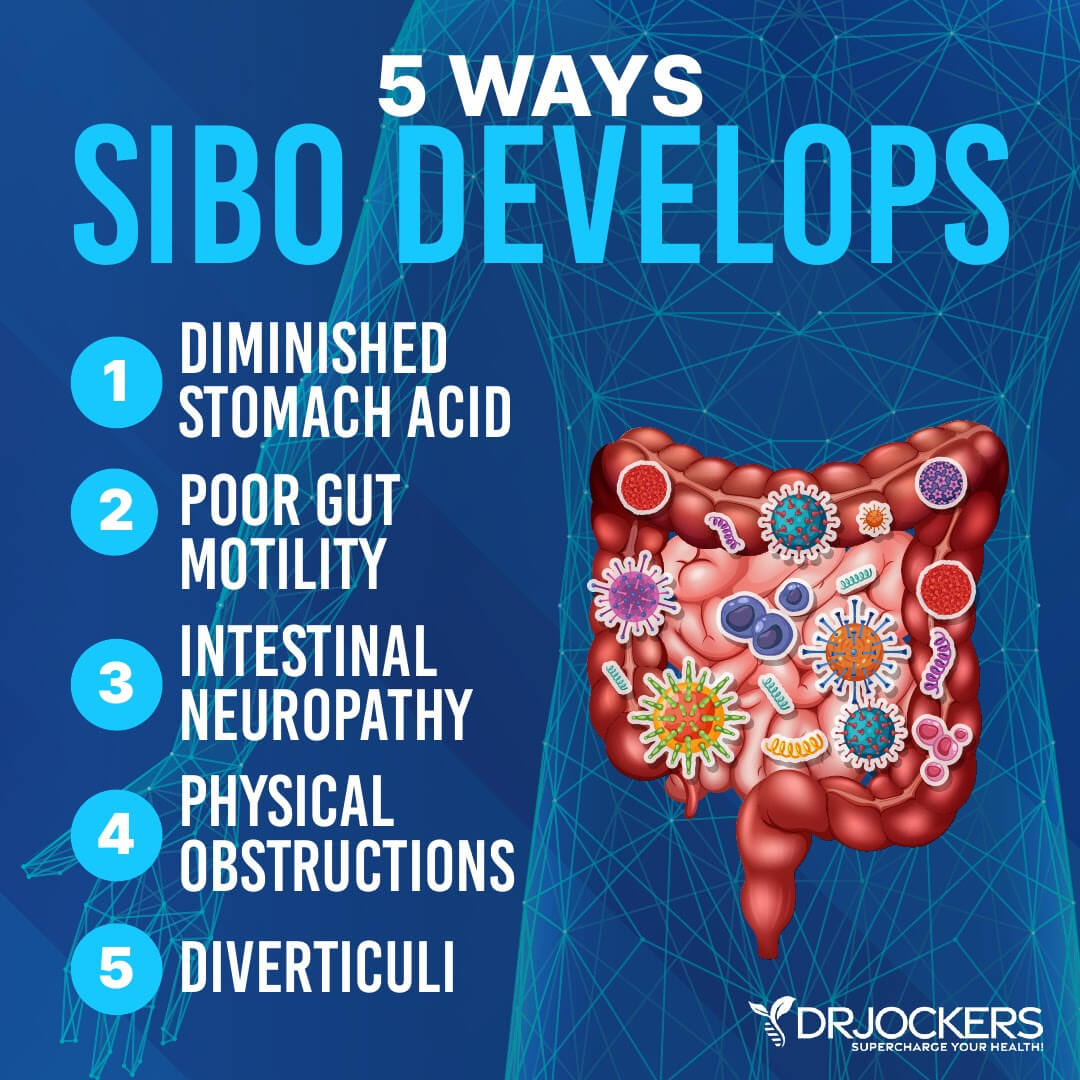
Medications that Disrupt Gut Flora
There are also medications that influence or disrupt the microbiome, such as antibiotics, acid-blocking drugs (PPIs), and steroids. If you have taken any of these for a period of time it makes you much more susceptible to developing SIBO (14).
I always ask my clients if they have been on these medications for a period of time. If they have been on any of these medications for more than 2-3 weeks at a time, I highly suspect they are dealing with some form of SIBO.
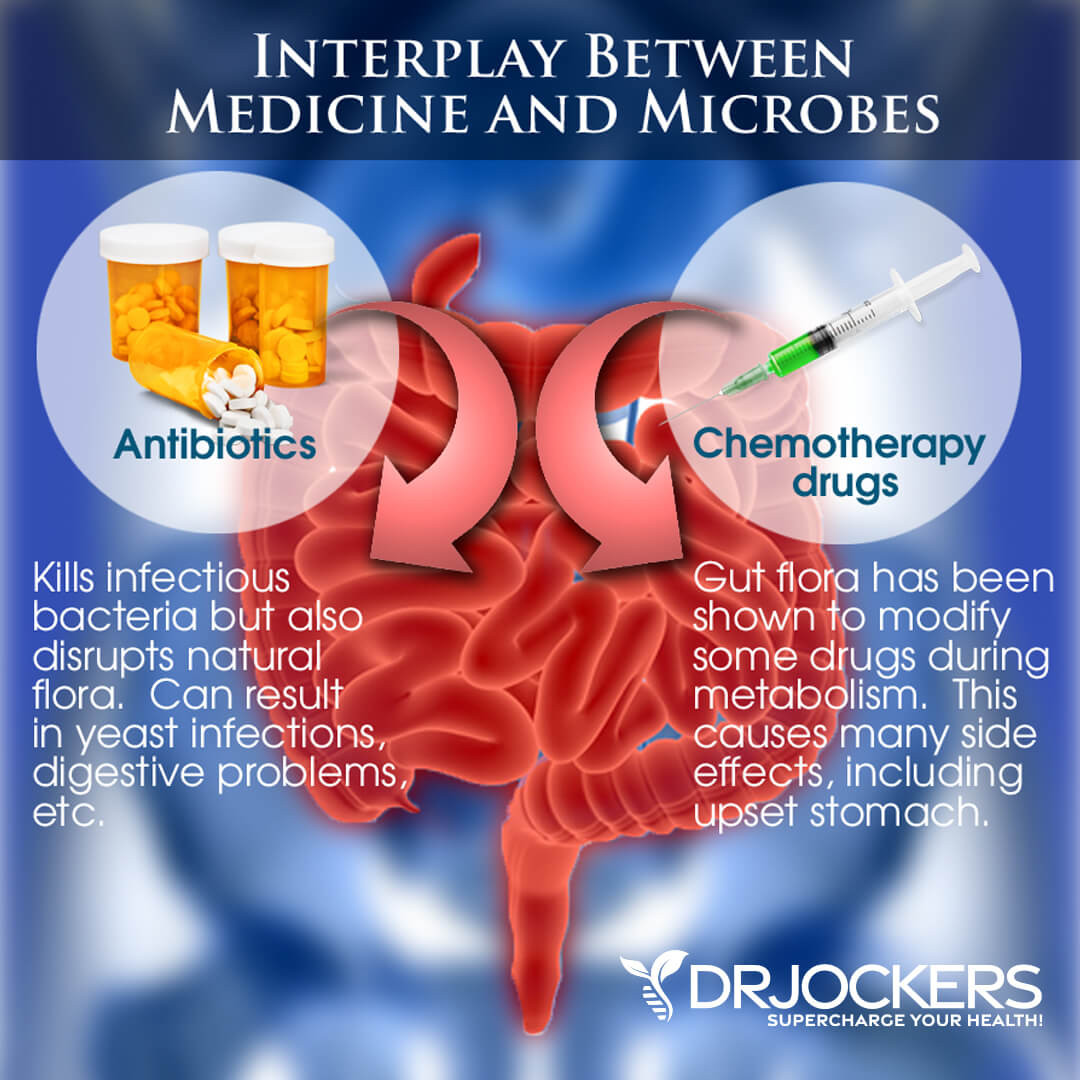
Best Ways to Test for SIBO:
The most important factor is a thorough understanding of one’s health history and symptomatology. There are three lab tests that are known to test for the presence of SIBO.
Breath Test:
This is the gold standard, however, it’s not an easy test to administer or perform. Individuals must fast for 12 hours, breathe into a small balloon, ingest a precise amount of sugar, and repeat breath samples every 15 minutes for 3 or more hours. Abnormal breath tests can also signify pancreatic insufficiency and celiac disease. We offer this test here
Organic Acid Test:
This is a simple urine test that looks at a number of different metabolic biomarkers. It will analyze for neurotransmitter disruptions, B vitamin deficiencies, mitochondrial issues, oxalate malabsorption, and toxicity issues. This test also looks at urinary biomarkers from both yeast and bacterial overgrowth.
This test is much easier for patients and only requires one single urine specimen. This is the test I use most often in my clinic but it is NOT a true diagnostic test for SIBO whereas the breath test above is. You can find this test here
Comprehensive Stool Analysis:
This is also a functional medicine lab test looking at the flora of the large intestines. It is not definitive for SIBO; however, if I see all elevated levels of good and/or bad bacteria in the stool I suspect SIBO.
It is also very good at looking for the overgrowth of pathogenic bacteria and parasites such as H Pylori, Klebsiella, Candida, Blastocystis Hominis, and more. This is not a confirmative test for SIBO but can be backed up with the Breath test to confirm SIBO.
How to Treat SIBO:
The most common medical treatment for SIBO is antibiotic therapy. This has been shown to be effective at lowering bacterial counts and reducing the symptoms of SIBO. Unfortunately, this also creates shifts in the microbiome that can cause continual reoccurrence of SIBO (15).
A study published in the American Journal of Gastroenterology concluded that SIBO patients who were treated with antibiotics had a higher recurrence rate and the GI distress was worse upon reoccurrence of SIBO (16).
Antibiotics are oftentimes the best course of action for someone with SIBO, but they should NEVER be the only course of action. Much more important is the 4 R program below!
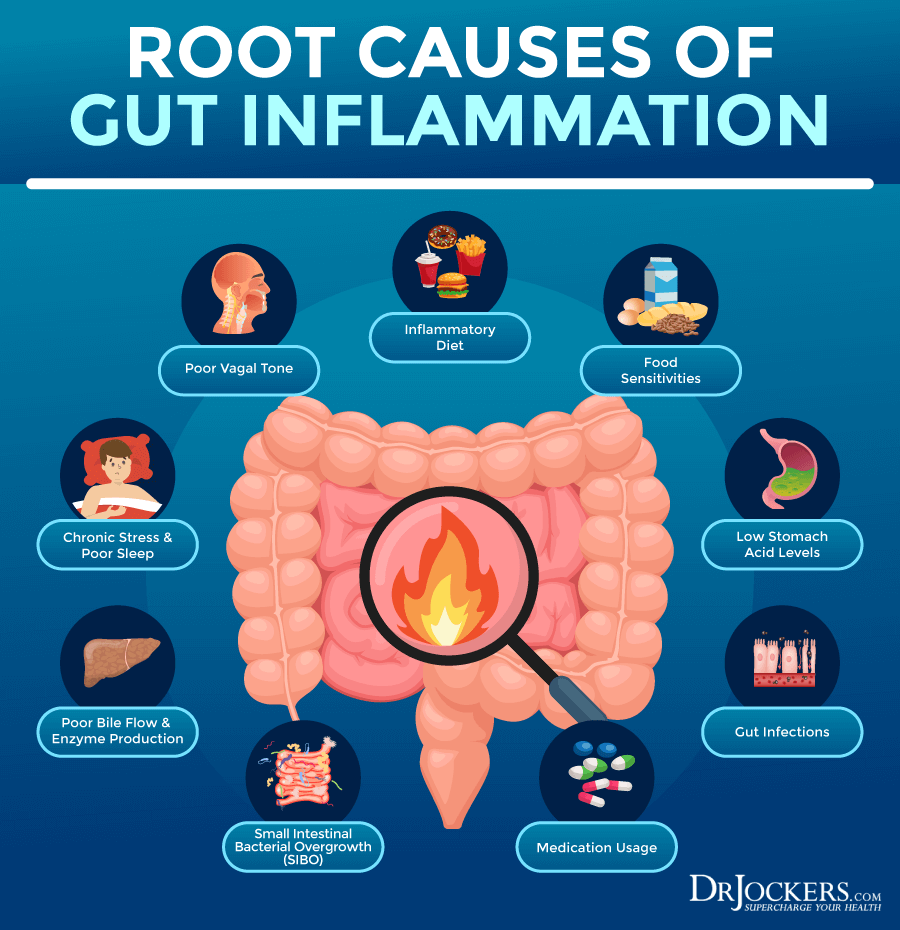
The 4 R’s of Healing SIBO and the Gut:
1. Remove: Remove the bad stuff. The goal is to get rid of things that negatively affect the GI tract such as inflammatory foods, infections, and gastric irritants like alcohol, caffeine, or drugs. Inflammatory foods such as gluten, dairy, corn, soy, peanuts, sugar and sometimes eggs can lead to food sensitivities.
I recommend a Low FODMAPS Elimination Diet and IgG food sensitivity testing to determine if any foods are a problem for you. Infections can be from parasites, yeast, or bacteria. A comprehensive stool analysis is key to determining the levels of good bacteria as well as any infections that may be present.
Removing the infections may require treatment with antimicrobial herbs or various medications.
2. Replace: Replace the good. Add back in the essential ingredients for proper digestion and absorption that may have been depleted by diet, drugs (such as antacid medications), diseases, or aging. This includes digestive enzymes, hydrochloric acid, and bile acids that are required for proper digestion.
3. Reinoculate: Restoring beneficial bacteria to reestablish a healthy balance of good bacteria is critical. This may be accomplished by taking a probiotic supplement that contains beneficial bacteria such as bifidobacteria and lactobacillus species. In some cases, individuals with SIBO and gut problems do not do well with lactobacillus species and that is when I focus on spore-forming soil-based organisms.
I recommend anywhere from 30 -100 billion units a day. Also, taking a prebiotic (food for the good bacteria) supplement or consuming foods high in soluble fiber such as beets, carrots, leeks, radishes, jicama, onions, garlic, and artichoke is important.
4. Repair: Providing the nutrients necessary to help the gut repair itself is essential. One of my favorite supplements is L-glutamine, an amino acid that helps to rejuvenate the gut wall lining. Other key nutrients include zinc, omega-3 fish oils, antioxidants, and herbs such as deglycyrrhizinated licorice (DGL) and aloe vera.
No matter what your health digestive health issue is, the 4R program is the best place to start in order to get you and your digestive system healthy. I have witnessed dramatic reversals of chronic and inflammatory illnesses in a very short period of time by utilizing this simple approach.
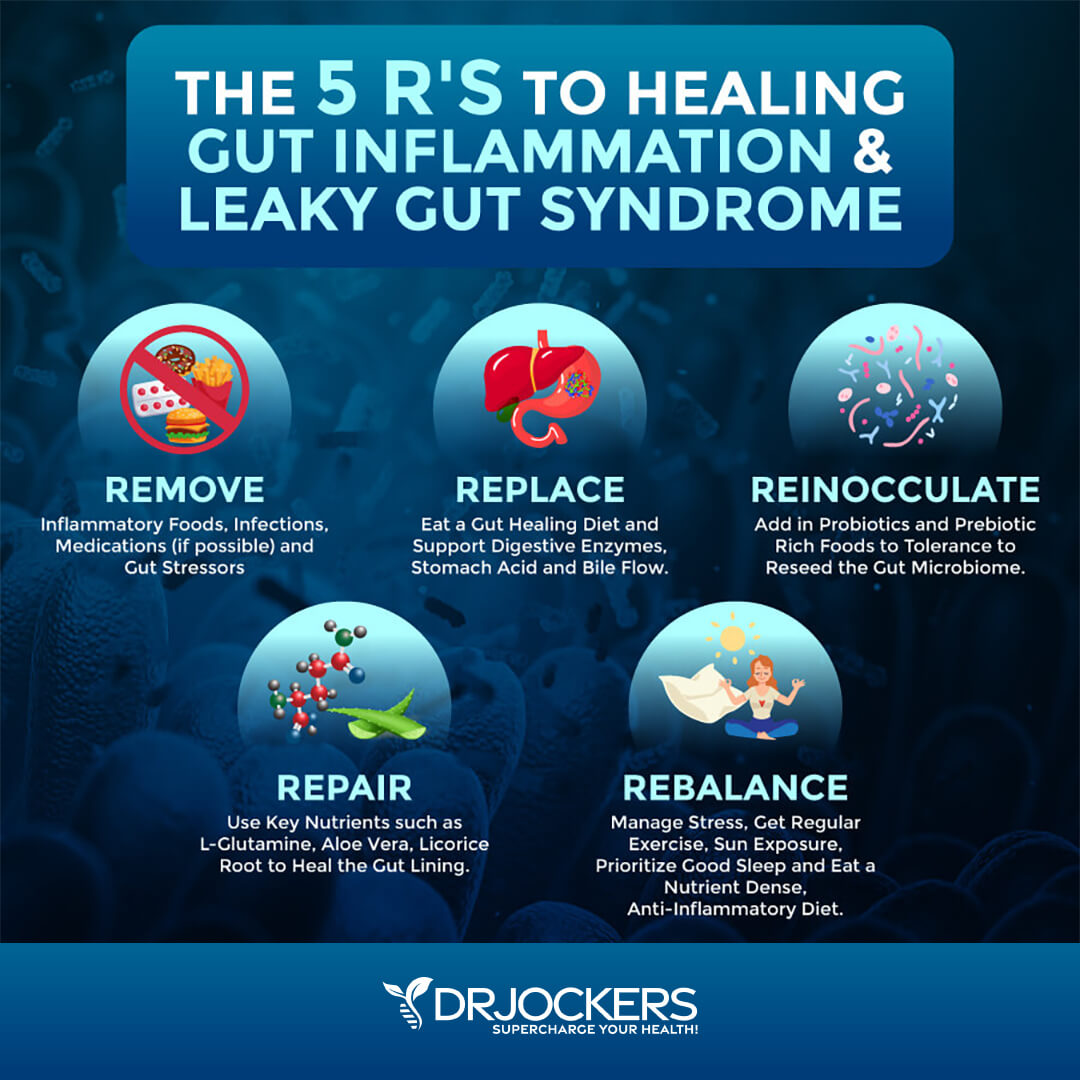
Natural Antibiotics:
There is a time and place for prescription anti-biotics, however, many of my clients (and I) prefer a natural anti-microbial regimen. Here are 3 of my favorite natural anti-microbials for eliminating bad bacteria.
Berberine: Berberine is a plant alkaloid derived from a variety of herbs, including Oregon grape root. This phytochemical constituent has a long history of use in Chinese and Ayurvedic medicine owing to its effectiveness and safety.
Berberine helps to destroy bacteria and other microbes, improves insulin sensitivity and blood sugar regulation, helps to balance neurotransmitters for improved mood, helps to reduce inflammation along the intestinal epithelia, and improves the strength and integrity of the gut lining (17, 18, 19, 20).
Grapefruit Seed Extract: Grapefruit Seed Extract (GSE) has very high amounts of disease-fighting, free-radical eliminating antioxidants and phytonutrients called bioflavonoids. These bioflavonoids are extremely powerful anti-microbials (21, 22).
A recent study from The Journal of Alternative and Complementary Medicine found that grapefruit-seed extract was effective in killing over “800 bacterial and viral strains, 100 strains of fungus, and a large number of single and multi-celled parasites” (23). No other naturally occurring anti-microbial can come close to these results.
Oregano Oil: This super herb is very rich in antioxidant phytochemical flavonoids and phenolic acids. Oregano Oil is also an extraordinarily powerful natural antibiotic. Oregano has been found in studies to be significantly better than all of the 18 currently used antibiotics in the treatment of MRSA staph infections and challenging microbial biofilms (24). The strong phenol antioxidants destroy pathogenic bacteria, viruses, and yeasts (25, 26, 27).
I have my clients use GI Clear which contains a number of other powerful anti-microbials to help clear bacteria, yeast, and parasites that may be present as well.
 Low FODMAPS Diet
Low FODMAPS Diet
For individuals with SIBO, it is advisable to begin on a low FODMAP elimination diet for 30 days. FODMAPS is an acronym for Fermentable Oligo, Di- and Monosaccharides and Polyols. These are all types of sugar based carbohydrates that are found in certain foods and are challenging on the bowel (28).
These sugars include glucose, fructose, galactans, polyols, and lactose among others. These can be problematic because they fuel the growth of the bacteria in the small intestine which aggravates the pre-existing overgrowth syndrome (29). Here is the list of the foods in these categories.
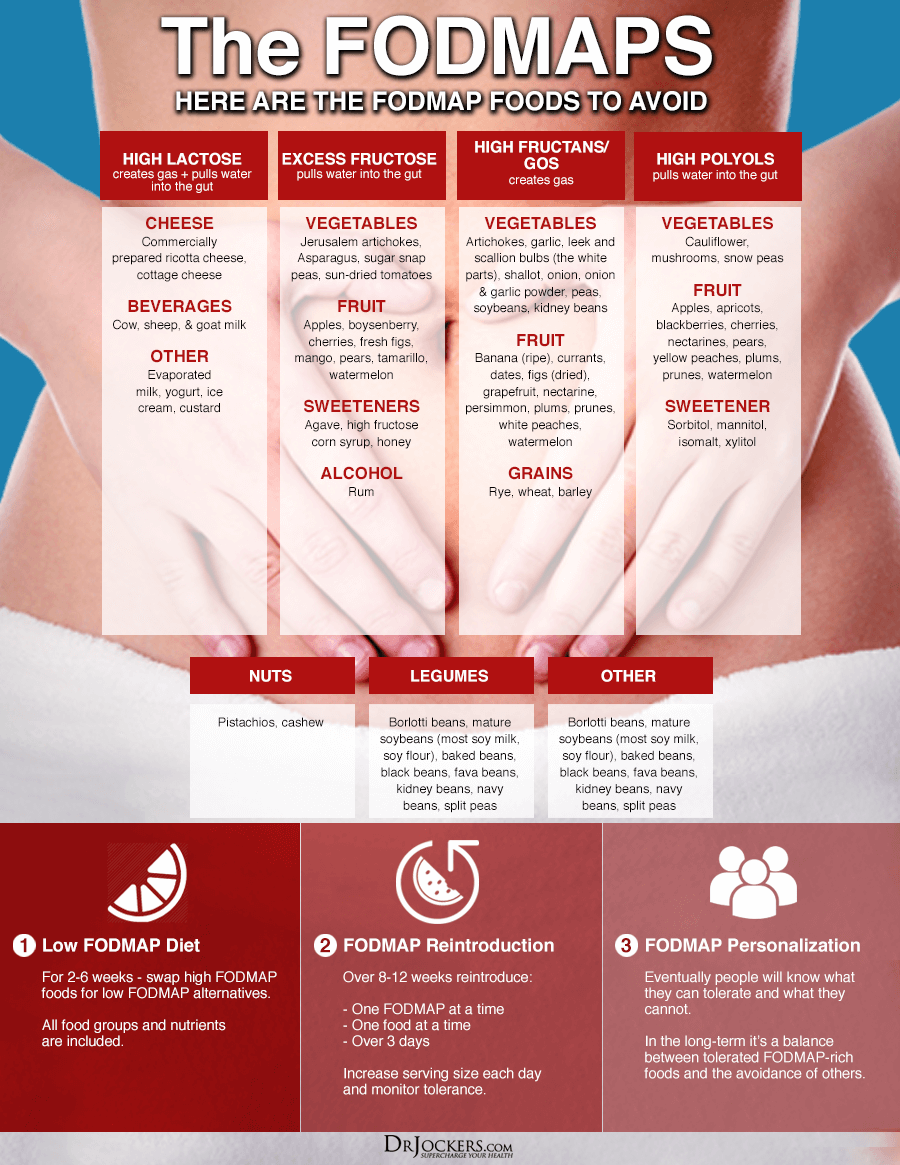
Leaky Gut – Low FODMAPS Plan:
It’s important to stick with a total elimination of the foods on the “avoid” list for this period. Reading the list, it may seem like there’s little left to eat — however, there are plenty of great-tasting and healthy foods on the SIBO diet.
The typical nutrition plan for someone struggling with digesting FODMAPs is somewhat restricted but not too terribly difficult to figure out. Breakfast can include a protein shake with coconut milk and a vegan protein such as hemp, brown rice protein, or pea protein. One could also do pastured eggs cooked in coconut oil with green veggies like spinach or kale, herbs, freshly squeezed lemon, and herbs.
For lunch, these individuals could do a big salad with olive oil and grass-fed cheddar cheese or pastured chicken. For dinner, they could do a small salad with cucumbers and grass-fed beef or wild-Alaskan salmon or another quality animal protein with olive oil, fresh lemon, and herbs. Some individuals can handle small amounts of fully steamed broccoli, cauliflower, or cabbage.
If you have any gas or bloating, try to locate what you consumed that may have contributed to that and avoid that food. You should notice a week with minimal health problems.
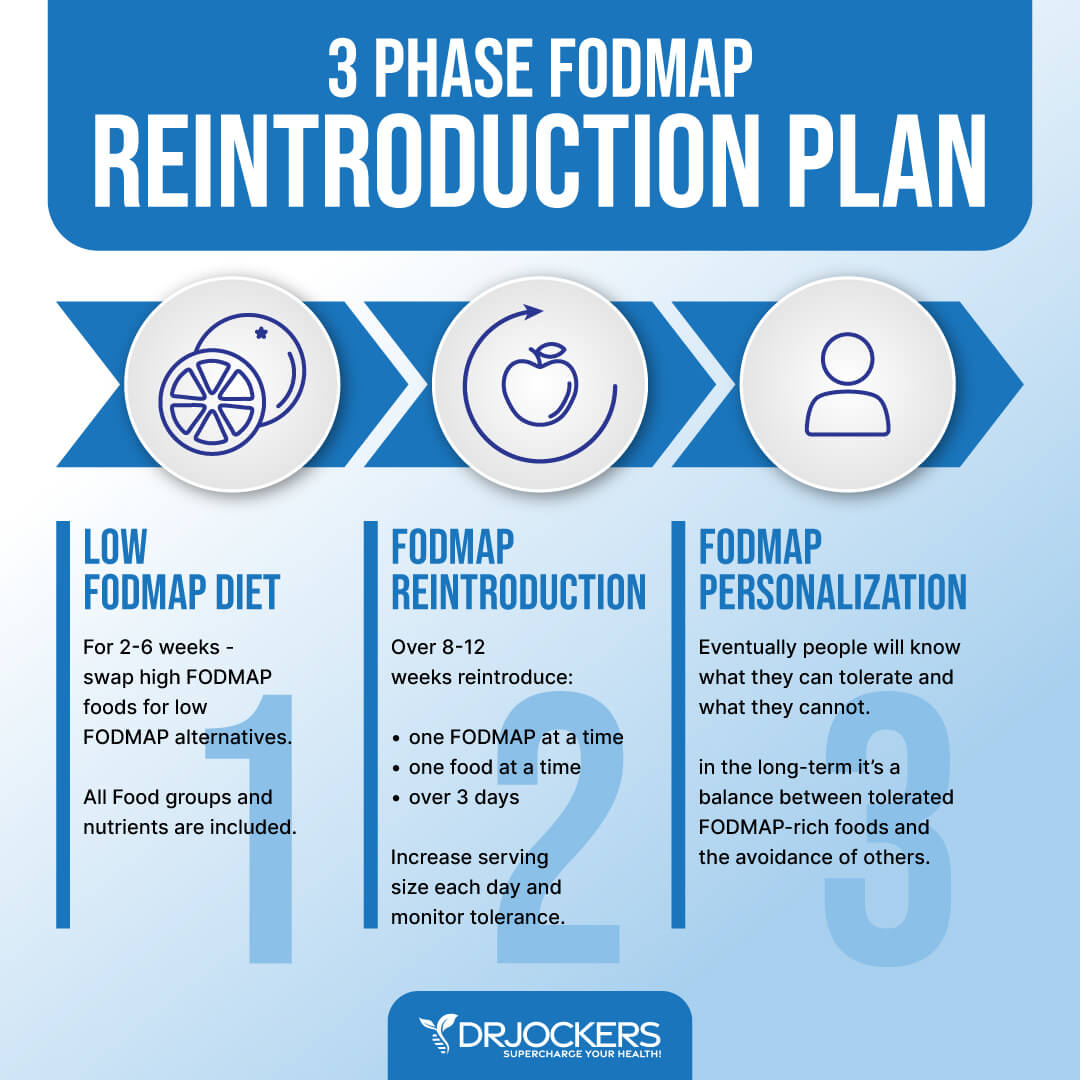
GAPS Diet Approach:
GAPS diet stands for Gut and Psychology Syndrome developed by Dr Natasha Campbell-McBride. Dr Campbell was one of the first to recognize that when the body has a dysbiotic state and resulting leaky gut syndrome it creates an inflammatory process that affects all regions of the body (30).
In particular, the brain is extremely susceptible to this inflammatory stress, and it appears to light up regions of the deep limbic system, basal ganglia, and anterior cingulate gyrus of the brain that are associated with depression, anxiety, and obsessive-compulsive disorders.
The GAPS Nutrition plan helps to repair leaky gut syndrome by providing supportive nutrients and re-innoculating the gut with healthy probiotic enriched foods. This process helps to heal IBS and improve symptoms of anxiety, obsessive compulsive disorder, ADHD, Autism, and depression.
There are a number of foods that you need to continue to avoid on this plan. All grains, processed sugars, high-starch foods, processed foods, and non-organic meats and dairy should still be avoided. Your system is still healing from SIBO, and repairing your digestive tract and getting your body back in balance are the priorities.
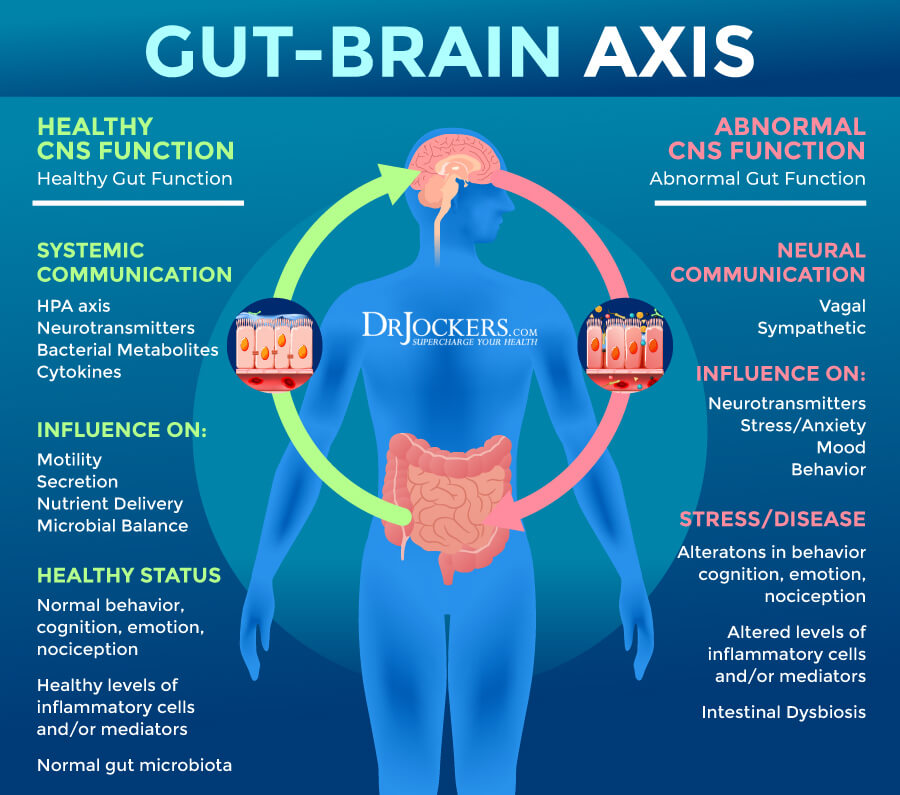
GAPS Diet – Important Guidelines
- Drink one cup of bone broth with each meal.
- Use coconut oil or grass-fed ghee for cooking.
- Only eat low-glycemic fruit (berries, lemons/limes, granny smith apples & grapefruit)
- Never eat fruit with meat of any type
- Introduce probiotic-rich foods slowly (sauerkraut, kimchi, coconut water kefir, etc.)
- Don’t eat pasteurized dairy (including yogurt); consume only fermented raw dairy as tolerated.
- Include one tablespoon of fermented vegetable juice with each meal. (Sauerkraut juice is readily available.)
Incorporate organic coconut oil, grass-fed ghee, and coconut butter whenever possible during this stage. These are all rich in medium-chain triglycerides which are easy on the digestive system and help support the health of the gut lining and blood-brain barrier.
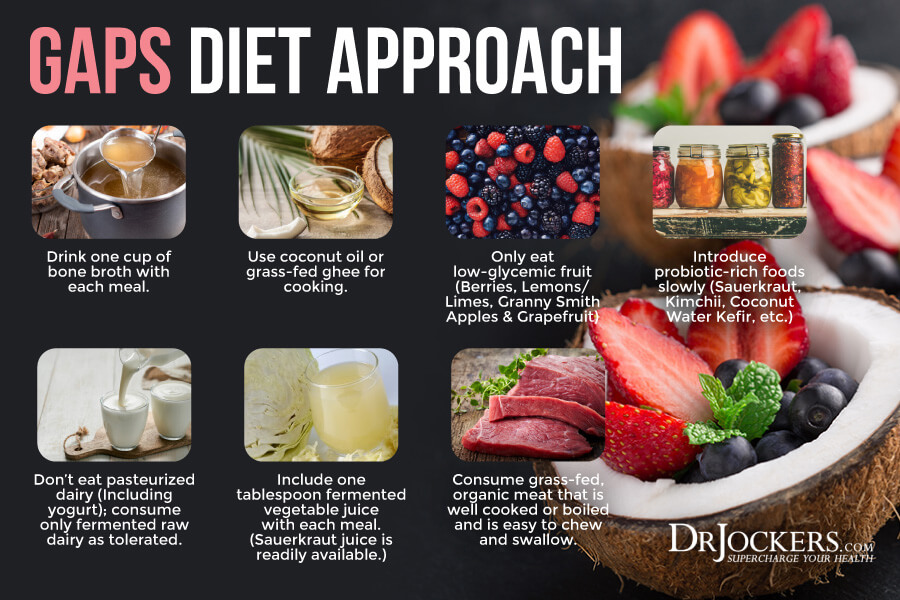
Probiotic Treatment:
Probiotic supplementation has been demonstrated to improve gut barrier strength and integrity, reduce pathogenic bacteria levels, modulate the immune system, and reduce inflammation throughout the body. Probiotic supplementation is a key part of the full restoration from SIBO and has been shown to be superior to antibiotics in the treatment of SIBO (31, 32).
Lactobacillus plantarum, lactobacillus acidophilus, lactobacillus casei have all demonstrated effectiveness in the treatment and management of SIBO. Conversely, lactobacillus fermentum and saccharomyces boulardii have been found to be ineffective (33).
Both lactobacillus plantarum and lactobacillus rhamnosus have been shown to be effective in suppressing abnormal gas producing organisms in bacterial overgrowth syndrome. High quality probiotics taken in uncomplicated cases of SIBO can usually result in the individual becoming symptom free (34). Probiotic therapy may need to be taken continuously to prevent the return of overgrowth of gas producing bacteria (35).
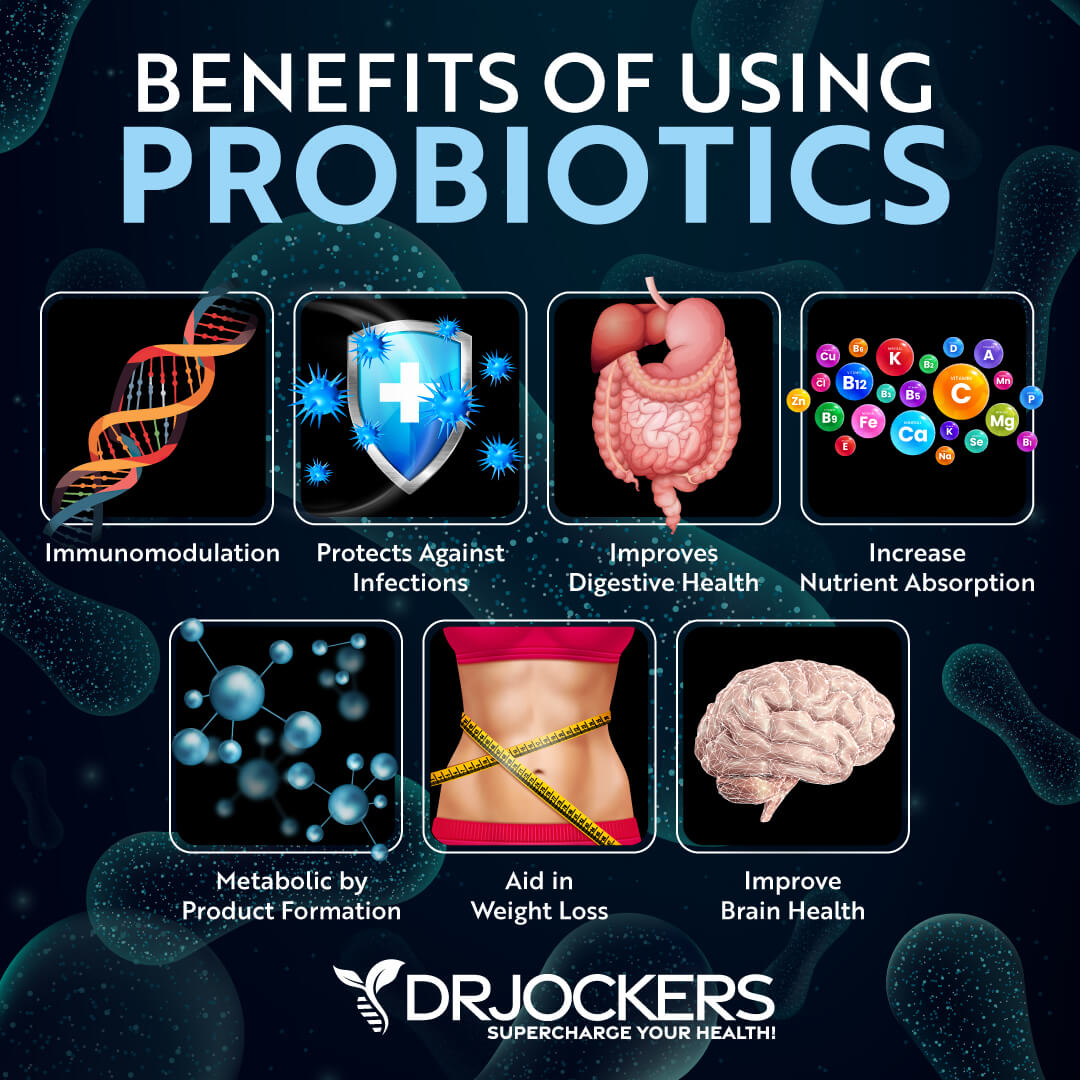
Soil Based Organisms:
For most of the history of mankind, we lived in close contact with the Earth. The majority of our diet consisted of foods and water that had soil clinging to it. This soil was not an inert substance but was a dynamic mineral rich, probiotic infused source of electrochemical energy.
The unique soil-based probiotics bacillus subtilis and bacillus coagulans were some of the key components that gave the soil its powerful nutritional benefits. This bacterium is called a human soil organism (HSO) and has an extraordinary ability to survive harsh environments.
B subtilis and coagulans are fully resistant to bile salts and can handle the harsh stomach acid environment which allows it to get into the digestive system and colonize. It has beneficial effects on the digestive system (36, 37, 38). Research has revealed that supplemental B subtilis and coagulans improve symptoms of irritable bowel syndrome (39).
B subtilis and coagulans are able to suppress the growth of harmful pathogens, strengthen the mucosal biofilm, and enhance the growth of other good probiotic strains such as lactobacillus species in the gut microflora (40, 41).
Many individuals with SIBO struggle with any lactobacillus strains of bacteria and need soil based, sporm forming bacteria of the Bacillus strain. Clinically, I will use MegaSporeBiotic, which is a soil based, spore forming probiotic that is typically well tolerated and works to reduce gut inflammation and improve immune function.
Later on, I will often add SBO Probiotics with my SIBO clients as they begin to feel better and then I will often switch to a lactobacillus and bifidobacterium rich probiotic.
Natural Strategies for Healthy Gut Flora
There are many natural strategies to help support a healthy gut flora. These strategies are not all at this time FDA-approved to prevent, mitigate, treat, or cure SIBO and should not be confused as such. You should always consult with your physician before stopping or changing medications or taking on new health strategies.
Additionally, you should be working with a functional health practitioner to help guide you through these strategies. This is not an exhaustive list and there are other natural therapeutic strategies that I and functional health practitioners will utilize to help individuals with SIBO.
1. Bone Broth Fast: Do a 3-7 Day bone broth (grass-fed beef, chicken, or fish bones are the best but you can do vegetable broth as well) fast to cleanse the gut and starve out the bacteria while providing nutrients such as proline and glycine that are necessary for the gut membrane to heal.
You can have herbal teas and organic coffee with coconut oil and ghee along with the bone broth this fast.
2. Low FODMAPS Diet: After completing the bone broth fast (even if you can only do 1 day or 24 hours) begin following the Low-FODMAPS diet plan here for 14 days.
3. GAPS Diet: After finishing the 14 days on the low FODMAPS plan, move into a low-FODMAP GAPS diet here for the next 14 days where you begin to add back some fermented foods and beverages.
4. Slow Reintroduction: Add higher FODMAP group foods back into your system slowly. Take one food (such as avocado) and add it back for 3 days and see if you notice more gas, cramping, and other digestive issues. If so, eliminate that food, go back on GAPS-FODMAP diet for 2-3 days, and then try another food with higher FODMAP food (onion).
5. Hydration: It is especially important to focus on hydration and electrolytes during this period. Aim to drink a minimum of half your body weight in ounces of water. Most individuals with SIBO respond really well to high amounts of water as it helps to flush out bad bacteria from the system.
I will often tailor programs to help individuals with SIBO super-hydrate their systems with great success. It is also advisable to use good pink salts such as Himalayan sea salt adding in 1/4 tsp per 8oz of water to help mineralize the body.
6. Use Organic Acids: Individuals with SIBO typically respond well to small amounts of organic acids such as apple cider vinegar and lemon juice. Add these to your water or herbal teas. Proper ratios would be 1-2 tbsp. of ACV per 8oz of water or 1/4 – 1/2 lemon per 8oz of water.
These acids help to kill off bacteria and improve the production of digestive juices such as hydrochloric acid, bile, and pancreatic enzymes. Drink them between meals and before a meal to improve digestion function.
7. Intermittent Fasting: I have my SIBO clients do intermittent fasting where they only consume foods between a 6-8 hour eating window each day. The fasting window helps to starve down the bacteria and reduce their count. It also helps enhance the healing process and the restoration of the gut lining. Read this article for more information on intermittent fasting.
8. Liquid Nutrition: I recommend consuming protein shakes with berries and coconut milk or raw, grass-fed milk (if tolerable) and a high quality protein powder. I am also a big fan of soups, stews, bone broth, green juices, herbal tea, and coffee with coconut oil and grass-fed ghee. Also doing some coconut water kefir and sauerkraut or kimchi juice early in the GAPS is a great idea.
Liquid nutrition is easy on the digestive system and reduces stress on the stomach, liver, gallbladder, pancreas, and intestines. This enhances the healing process of the body.
9. Fermented Foods: Begin slowly adding in fermented veggies such as organic and live sauerkraut, kimchi, natural pickles, coconut water kefir and coconut yogurt. Consuming a few tbsps. throughout the day and especially with any larger meals is especially helpful.
10. Oil Pulling: Doing oil pulling with coconut oil and a drop of essential oils is especially helpful. This process reduces the microbial load on the body and improves immunity. Read this article on oil pulling here
11. Get Moving and Regular Sunlight: Moving on a regular basis, especially light intensity movement such as walking helps reduce inflammation in the body and improve bowel transit time. Getting regular sun exposure enhances the healing process through the assimilation of biophotons into the skin.
Additionally, sun exposure provides vitamin D3 which we want to optimize to heal effectively.
12. Improve Your Gut Motility: Improving bowel movement frequency and consistency is a key detoxification concept. Read this article for steps and strategies to improve bowel motility.
13. Utilize an Advanced SIBO Support Supplement Program: If you have moderate-severe SIBO then I would recommend using an advanced SIBO support supplement program and strongly considering working with a natural practitioner who is trained in helping people overcome SIBO naturally.
If you want to work with a functional health coach, I recommend this article with tips on how to find a great coach. We do offer long-distance functional health coaching programs with our world class team of health coaches. For further support with your health goals, just reach out and our fantastic coaches are here to support your journey.


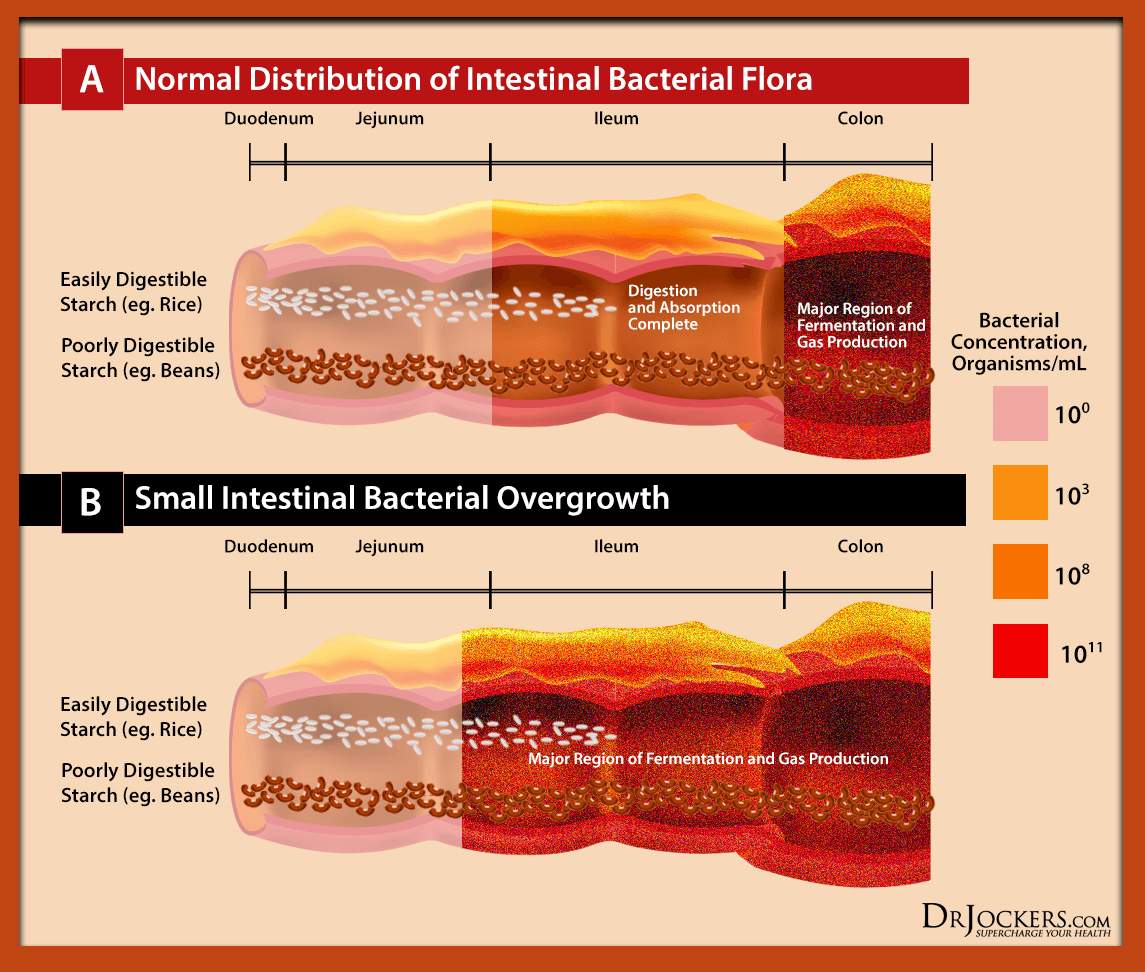
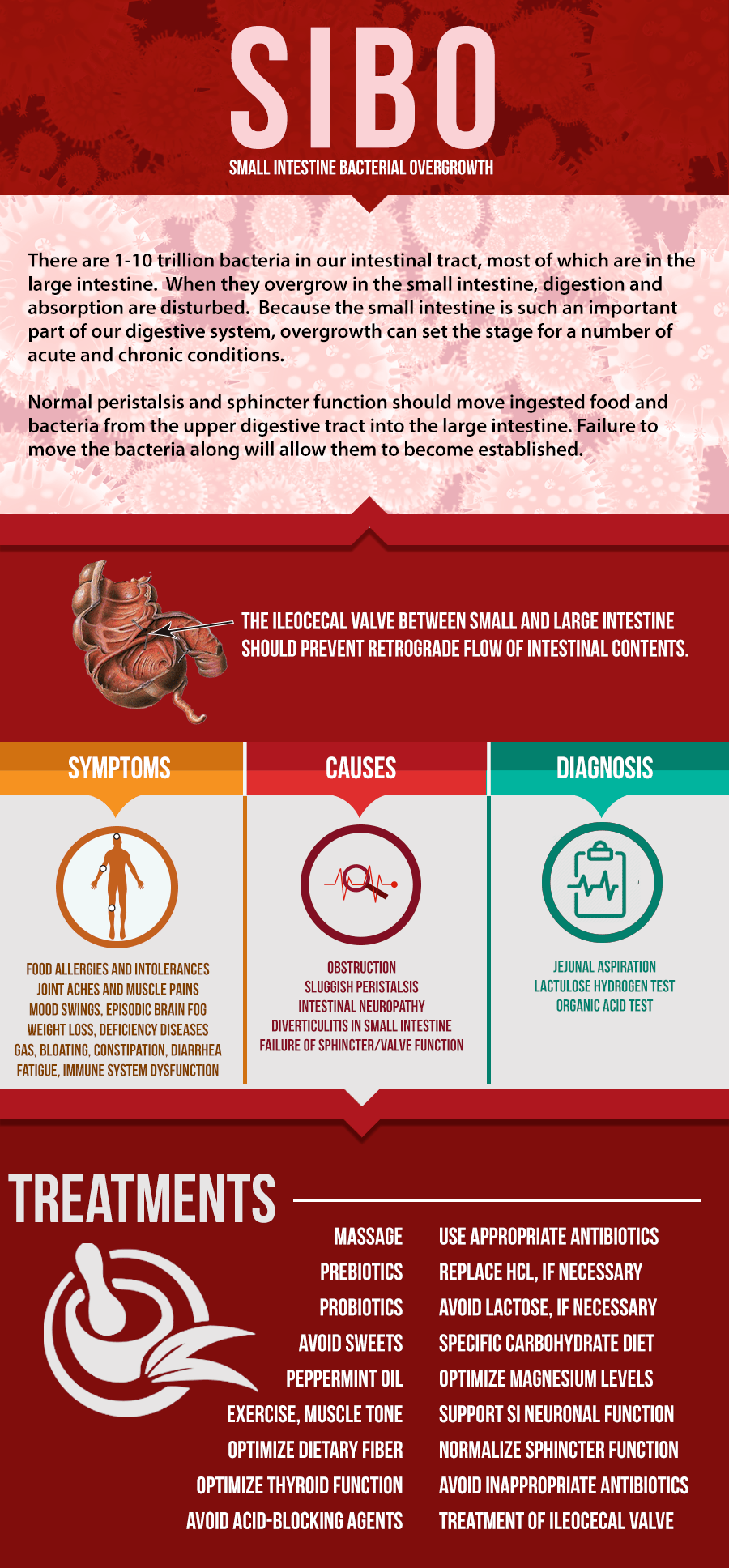



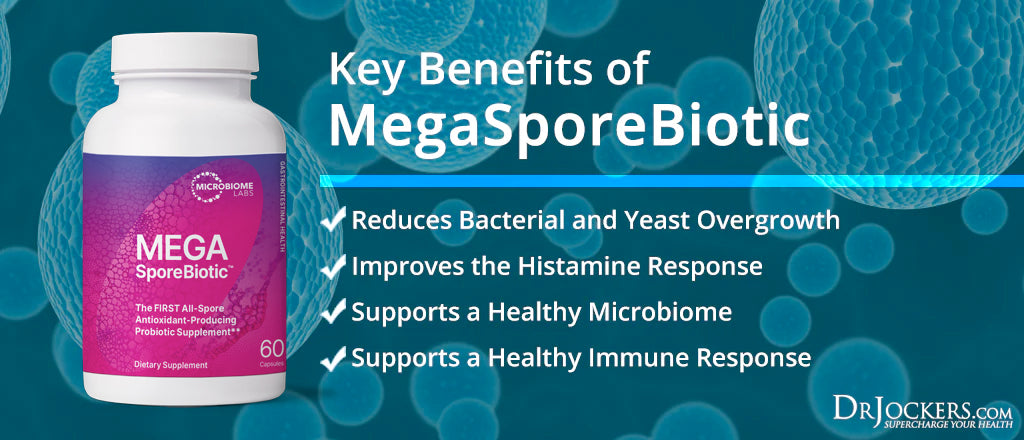




Thank you! This is the exact article I needed to read. I went to bed last night after searching the internet for info on SIBO, low FODMAP’s diet and appropriate supplementation. In the morning I woke up to find this article in my Inbox. God and the Universe work in mysterious ways!
So great to hear that this article helped you at exactly the right time! God is good!
Hi. Do you have any testimonies of people you have treated that have fully healed and gotten rid of SIBO? If so, could you please direct me to it. I want to heal desperately.
Yes in our testimonials section here: https://drjockers.com/category/testimonials/
What do you think of the supplement Atrantil for SIBO? It’s brand new on the market. Developed by a Gastroenterologist.
This very well could explain what happened to me several weeks ago. Thank you for the information.
i started atrantril , I was wondering if you could give me any info about it , and if it helps .
Are the products in the support pack ok to use if the ileocecal valve has been bypassed due to surgery resulting in bile salts diarrhea and SIBO?
CG,
This is a great question and the answer is yes. These products will help to restore the best possible function to your GI Tract. Obviously the surgery has created some permanent damage, but you will heal and function better following a program like this.
Since atrantril has peppermint oil as an ingredient .
Will it cause reflux (since peppermint is a reflux trigger )
Most people actually have relief of reflux with peppermint. However, if you notice it causing more problems than best to avoid.
I have a mild case of SIBO and took antibiotics which did not help so after my GI saw no improvement he said he believes I actually don’t have SIBO because the only symptom I have is Gas. After that I saw a functional medicine Spe and she put me on a FODMAP diet with no grains because I came out with The celiac gene, gluten sensitivity and MTHFR mutation. But she was not 100% into the FODMAP and allowed me to eat some foods which are high in FODMAP. After 3 months no improvement so I fired her. She also put me on a 6 ingredients tea like Garlic and Oregano oil which again did not help. I also lost weight ( mostly after going on these diets) brain fog, chest muscle/rib-pain (mild) and feeling weak all the time so she said it was a leaky gut. btw I have been taking Ancient Nutrition Protein bone broth 2-3 times daily which is one of the products on your packs. (Love it!) So my question is this, is the basic Digestive Support Pack good to start after you finish step one (the 3-7 days bone broth fasting)? and are these products gluten/grain free?
Great question Jose. Yes, these products are 100% gluten and grain-free and are good for a mild case of SIBO. https://store.drjockers.com/collections/support-packs/products/basic-digestive-health-support-pack
Sorry, but I have 2 more questions. Can we take the bone broth you have here on the 3-7 day fast and can we take it with organic coconut milk (can)?
Yes you can do both!
“..or consuming foods high in soluble fiber such as beets, carrots, leeks, radishes, jicama, onions, garlic and artichoke is important.”
Not a bad article – but this is truly terrible advice.
I have Scleroderma and SIBO is rearing its ugly head for me again. I have bloating, constipation, gas and distention. I can’t seem to handle anything. I do not want to have to go on Xifaxin again. I have been trying to maintain a low fodmap diet for a long time, over a year and a half, but now it seems like i cannot tolerate anything. I bought organic bone broth after reading your very informative articles, and started today. Hoping I can do this for at least 2 days. Do you have any suggestions?
Anne,
So sorry to hear about this. Try some of the strategies outlined here and here.
You may greatly benefit from having some functional lab work done. For this, email nutrition@drjockers.com and we can figure something out!
Hi David , just wanting to know how long you would use the herbs to kill klebsiella overgrowth ( been using them for 10 weeks straight). We are doing the very strict diet, pro and prebiotics along with homemade yogurt and water kefir. Would another stool test be the only answer?
Hey Alana good question. Really the best way to know you’ve gotten rid of a pathogen is to retest!
Can I do all 4 Rs together…kind off? The FODMAPS diet or any other different diet is too complicated and too difficult for me. I don’t have time to diet or cook for myself. Can I just starve the bad bacteria and then eliminate the triggers (bad food, carbohydrates, sugar, coffee, alcohol, gluten, white flower, bread, lactose) and eat SIBO friendly food (chicken breast, salmon, avocado, etc) without dieting, and take probiotics VSL#3 and Creon digestive enzymes, and drink bone broth 3 times a day at the same time? Will that help?
Also, lost 30lb since March this year and I’m week…nutrition and vitamin deficiency! So I think I have leaky gut too. So will eliminating the SIBO also stop the leaky gut?
Hey Adam, unfortunately it is hard to say. It may help, but I see more reliable results following the protocol as designed. Trying to do everything at once can be very stressful on the body and create other problems. I hope this helps, you have more time than you think! I do have a digestive restoration program that is designed to make the process as simple as possible. You can check it out here: https://drjockers.com/the-digestive-health-restoration-program/
Hello, can I choose to drink all 3 of the natural herbal antibiotics at the same time? Or will that do more damage to my system? I am so desperate for a cure since I have been having this for 9 months already.. and halitosis ruins my social life, even with my family. Any successful natural treatments for SIBO permanently?
Everything in this article is meant to be implemented in a sequence together and is designed to work synergistically to help combat SIBO. If you would like a more guided approach you can get in touch with one our health coaches!
Hi David
I am with a health coach with another company but you have a lot more detail in your programs
How can I get in touch with you? Are the same herbs used for sibo as parasites ? What about leaky gut and which should you start first I’m confused to be honest
What about Candida ?
Need guidance please
Hello Patricia – yes you can find our coaching programs here: https://drjockers.lpages.co/long-distance-coaching-dr-jockers/
What product would you recommend for undergrowth for Lactobacillus but overgrowth for Bifidobacterium?
Hey Natalie, good question. You could try using a soil based probiotic such as this one: https://store.drjockers.com/products/prescript-assist-broad-spectrum-probiotic
Use that one for 1-3 months and cycle to this one: https://store.drjockers.com/products/sbo-probiotic
After another 3 months, you can cycle to this one: https://store.drjockers.com/products/probiocharge-30billion-cfu
Generally, cycling your probiotic every 3-6 months is a great strategy and I like to do this between a soil-based and lactic acid based probiotic such as the ones reccomended above
Are there diets that would work for vegetarians? It seems like this advice is geared towards omnivores. I wouldn’t be able to survive on lettuce alone! 🙁
Hey Adam, if you have true SIBO, it is really tough to overcome on a vegetarian diet as it is important to avoid the FODMAP group. But you can try to subsist on low FODMAP veggies…just not much options there.
I was recently diagnosed with SIBO. My bowel movements have changed. It is not one piece of stool, but rather individual pieces that float. Is that common with SIBO and why?
Irregular bowel movements are definitely common with SIBO. I hope the strategies in this article help!
At what point in the sequence do you start taking probiotics?
Also when in the sequence is best to start taking the Herbs?
Do you recommend live herbs or herbs in supplement form?
James
Hey James, Antimicrobial herbs during the remove and replace phases, probiotics added during the reinoculation phase
Herbs: https://store.drjockers.com/products/gi-regulator
Probiotic: https://store.drjockers.com/products/sbo-probiotic
Hi!
I think I have leaky gut and/or Sibo. Since December 2017 I’ve had chronic back pain that radiates to my chest, & feels like a band around it. I haven’t worn a regular bra since January as it hurts. I get left rib pain often & I go to the washroom 2-4 times a day, the bowel is usually loose & I see undigested food. I also suffer from low iron, iron capsules don’t help.
Will your Sibo support pack for sale cure my Sibo along w/ a Sibo diet? Will I only require to finish all the supplements of the support pack and I should cure Sibo/leaky gut? Is there full instructions? Is it ok to mix all the supplements? Can I still continue to take my iron capsules? I also take thyroid med in the morning.
Sorry for the long email. looking forward to your response 🙂
I also forgot to ask, all my symptoms mentioned above, back pains, chest pain, tightness ect a because of Sibo? Heart issues have been ruled out…
Hey Sahar, yes these suggestions will be helpful. You may also need to use digestion support such as enzymes and an HCL/Bile supplement such as this one: https://store.drjockers.com/products/bio-gest
Hi Sahar, you are tracking just like I did. All sorts of pain and fatigue is associated with being functionally anorexic, mal absorption of nutrients even if you are over eating, even if you dont look the part. One of my jokes is how do I look fat and skinny at the same time? Advanced SIBO can have weird symptoms too: feeling like you are suffocating after eating normal diet because bacteria in your gut, if fed sugar or carbs could be producing hydrogen or methane. Doctors could not figure it out with me. 3 years later, how many CT scans do I need of my lungs and heart before they realize that isnt it? Radial pain could also be from stomach acid leaking into your abdomen with Leaky Gut Syndrome. Fasting and IV nutrients is the absolute quickest road to recover. Lots of bone broth, aloe, calendula, comfrey. Think gentle salves. Buffered C, lots of D vitamins. Maybe some antibiotics if you are sick enough. My doc prescribed rifaximin (took with chlorophyll to keep tummy from hurting) which I stopped after 2 weeks due to weird and excessive bruising. Its a tough starting point but you will feel so much better than with your normal diet that you wont want the sugars and carbs that are hurting you. After fasting a week or two you can eat small portions of meat and eggs and really fermented foods and veggies. Mac nuts thank god! Fatty fatty cheese but no milk! Super papaya enzymes after every meal. Nip this in the bud or it will be life long. Look at earthclinic.com for more advice. Its a life saver.
Also this is important. A high rate of SIBO sufferers have low thyroid which slows down the digestive tract so that what you eat ferments in a bad way. Rubbing 2% solution of iodine on palms of hand and feet once a day is reccomended to boost iodine levels but dont overdo it. Sushi wraps have alot of iodine and thankfully a little white rice is digestable after a period of fasting. Go easy on the raw fish though as your immune system is toast right now.
Thanks for sharing Sam!
Thank you for the comprehensive information! I was wondering, if harmful bacterias were prevailing in one’s gut, wouldn’t it increase the amount of those barterias to bring in a lot of prebiotics in your diet? I thought both harmful and beneficial bacterias feed on prebiotics and fibers.
And also I was wondering how long would it take to exterminate those harmful bacterias. It would be really helpful to know how long would they be able to survive without any food supplies except for bone broth. (It’s been four days since I started bone broth fasting.) I hope 7 days of bone broth fasting could effectively starve the bacterias.
Thank you so much!
It really depends on the case Rosie. A Bone Broth fast is a great way to start out. Continuing with a low FODMAP diet with antimicrobials. 30-60 days may be necessary – then adding back in some probiotics slowly from there!
Great article. I’ve been dealing with IBS for over 30 years and diagnosed with SIBO three years ago. Have done tons of treatments so far. One of my biggest issues is acid reflex, it’s extremely severe, already affecting my through, it’s so bad I’ve been tempted to start taking proton pump inhibitors, even knowing how bad they’re for SIBO.
In your opinion can things get worse if I start taking them? I’ve tried everything under the sky for it and nothing has worked, even naturopaths and other practitioners.
I’ll try the bone broth cleanse and see what happens.
Thanks for such a complete article.
Hey Sandra, send our Functional Nutrition Practitioner Michael an email at michael@drjockers.com for a good protocol!
Good article! Have you seen people completely healed of Sibo using just supplements and diets Or do you typically feel they need an antibiotic and start a healing protocol??
I have dealt with both scenarios Sharon!
Following something like this while using natural antimicrobials may be helpful
https://drjockers.com/healing-leaky-gut-fasting-elemental-diet/
I’ve been dealing with SIBO for 18 months. Several doctors later, thousands of dollars later, it’s worse.
How could one work with you, or do you have a reference for SoCal?
Thank you
Hey Kristina! My health coaches work long-distance to help people overcome things like this. Send michael@drjockers.com an email to see if this is something you’d like to get set up!
This is all very well and good, but most antimicrobials even some natural give me reflux and acid coming up my throat into my mouth (I’ve a haital hernia). If I’ve mild gastritis too I don’t see how betaine hcl is gonna help.
And I’ve tried a million Probiotics. All they’ve even done is give me bloating and bad constipation.
Also I’m on many meds, and don’t where to start in terms of reducing them
So sorry to hear that Chris! Here is a really helpful article on Hiatal Hernias https://drjockers.com/hiatal-hernia-natural-treatment/
This article is very helpful, but what about those individuals with both SIBO and histamine intolerance. Many GAPS diet foods and bone broth contain high levels of histamine. What do you recommend? Thank you.
Yes for sure, actually a low-FODMAPs diet has been shown to reduce histamine levels. I would just avoid the broth and other higher histamine foods. Here is more info: https://drjockers.com/suffering-histamine-intolerance/
help!!! i am struggling with sibo what do ido
So sorry to hear that Michelle – follow the info in the article and if you want to work with our online health coaches, you can contact Danielle here: nutrition@drjockers.com
Recently I have been extremely gassy, to the point the pressure makes me want to throw up! I have to lie down to help the gas out. I’ve always had more gas than normal, but this is far worse. I can’t eat very much without feeling sick, it’s been 6 days. It’s interfering with my life and I don’t know what to do. Could the gas and nausea be sibo?
So sorry to hear this Joe! Absolutely, gas and bloating are major symptoms of SIBO. Be sure to follow the recommendations in this article and I would also recommend hiring a health coach to help you. https://drjockers.com/functional-nutrition-tips-to-find-a-great-health-coach/
Did this article mean PPIs RAISE the pH in stomach ? Not lower? Really great article regardless of typo. Very well laid out!!
Yes and we just made the correction. Thanks Lesley!!
Under The 4 R’s of Healing SIBO and the Gut, you state that consuming foods high in soluble fiber such as beets, carrots, leeks, radishes, jicama, onions, garlic and artichoke is important, but onions, garlic and artichokes are on the high FODMAP list of foods to avoid. I’m confused?
Hi Lore, Avoiding these common triggers in the beginning phase is important. After following a low-FODMAP diet you work to reinnoculate the gut with probiotics and prebiotic foods. This article offers greater detail: https://drjockers.com/beat-digestive-problems-low-fodmap-plan/
Would you please tell me where I could have these test done in the area I live. I live in western Montana.
Hi Howard, The kit provides specific instructions for you to follow and take to a testing facility. If you have any concerns in advance of purchasing the test you can call DHA Labs directly at 847-222-9546.
Would you please send me a link to your kit?
What’s your thoughts on my home made yogurt, and sour dough bread made from non gmo flour.
Ok, found where to order your kit. So I order the kit, and receive the results, who helps me interpret the results and provides recommendations.
Hi Howard, One of our nutritional health coaches will reach out to you once your results are posted by the lab! Preparing your own yogurt is great so that you can control the quality of ingredients! Even non-GMO flour is inflammatory. We have many recipes I love! Here are a couple you might like: https://drjockers.com/grain-free-bread/ & https://drjockers.com/keto-garlic-and-rosemary-cauliflower-bread/
Dr Jockers,
My naturopath says I have SIBO, my family doctor has me on proton pump inhibitor for a suspected ulcer and I have a diagnosis of M.S.
Since on the PPI my MS is flaring up and gas and bloating are way worse. Suggestions for a pobiotic that would help ith SIBOand not exacerbate the M S.?
Again fantastic article.
I am a case of returning SIBO. After I did the 4R approach with my functional medicine Dr.( took a year) My bloating was completely gone except I still battled some brain fog days.
Then looking back, I slowly included small amounts of bread, and occasional tortilla chips with no problem. After 8 months with no problems I started coffee enemas to address a possible parasitic infection, while I also got a UTI infection shortly after that and was given antibiotics for 8 days.
About 1 month after the coffee enemas were introduced and the antibiotic as well as my new slightly cheating diet SIBO slowly returned and is worse than the first time.
Do coffee enemas make SIBO worse? was it the antibiotic? I’m still so confused as to what I did to have this return after many months symptom free except the brain fog.
Your professional experience with SIBO returning is greatly appreciated.
Hey Diane, I am sorry to hear that you have struggled with this! Both anti-biotics and coffee enemas have the potential to worsen SIBO in some cases. I would recommend that you consult with your functional health practitioner to help you understand the root cause and customize a specific plan that is right for you!
Dr. Jockers, thank you for this article! I’m being treated for SIBO, parasites, and then candita, once the other two issues are taken care of. I’ve been sick for seven years, even since the birth of my second child…I now have four, and wellness is a huge priority for me! Enough with the brain fog and stomachaches! My practitioner is great and has me on all kinds of supplements and herbal antibiotics, but as for diet, she’s been vague. All she has told me is to go low oxalate. I’ve researched and researched, and don’t see much support of this helping. Your article is the most helpful I’ve found. It seems like research on SIBO is all over the map! My question is, what exactly is the GAPS/low FODMAP diet (do you have a list of what foods are allowed in that combonation?), and for how long should I remain on that diet? I understand, the low FODMAP is for 2 weeks, following the bone broth fast, but then how long should I do GAPS/low FODMAP? And, do I start that at the same time I start the herbal antibiotics? I’ve heard go high FODMAP during the herbal antibiotics, to scare all the bacteria out of hiding and thus, kill more of them. Thoughts? Thank you!!
Hey Crystal, so sorry to hear about your struggles. The GAPS/low FODMAP approach is a combination of GAPS – which focuses on using bone broth, well-cooked soups and stews with meat and veggies that are cooked very well and a low-FODMAP diet. You can try this for a week and see if you notice improvement.
Yes there are various strategies for using anti-microbials that include taking them with a higher FODMAP diet for a short period of time but that is what a skilled practitioner who knows your history can help you with. Our functional health coach Danielle is excellent with challenging cases of SIBO and can help customize a plan for you. You can find her info here: https://drjockers.com/nutritioncoachingdanielle/
Hey doc,
I developed gut issues after I went vegan, started getting fatigue and constipation. Switching to a low FODMAP helped clear my IBS, but the fatigue has persisted. Eliminating foods, even incorporating animal products hasn’t changed anything. Been 1.5 years now. My question is: can one have an underlying gut issue that produces cognitive issues, even though I don’t have the typical gut symptoms (cramping, diarrhea, gas etc.)? Btw I did take a SIBO test that didn’t come up positive for hydrogen or methane, was being treated for H2S dominant.
Thank you,
James
Sorry to hear that James, chronic fatigue like this is often related to Lyme disease and/or Epstein Barr infections. Those would be good things to investigate. https://drjockers.com/7-natural-remedies-epstein-barr-virus/
Hello, I was tested for Sibo and the results were that I have it severely..however I have never felt any such symptoms as bloating, stomach pain, etc. Instead lately I have been wheezing a lot and do have mild asthma and am wondering if that is related, also I do feel tired regardless of how much sleep I get. Do you know if shortness of breath and SIBO are related? Thank you so much!
Yes those can be related. I would try the SIBO protocol and you should see positive changes. Here is another helpful article as well https://drjockers.com/low-energy-8-common-things-that-rob-your-energy/
Hi, you recommend healthy fats for a SIBO diet healing protocol, however my research has led me to believe that fats no matter how healthy for those with SIBO/psoriasis is detrimental as our livers cannot digest fats! You are saying the very opposite it seems which is very confusing.
My research was based on the medical medium Anthony Williams by the way.
Actually this is not true. Healthy fats should be prioritized in our diets. They are not detrimental to our liver. However, excess starch and sugar is stressful on our liver so we would want to avoid that.
I tested positive for Hydrogen dominant SIBO and slightly elevated Methane. I do not tolerate broth. I have Hiatal Hernia, which my Chiropractor takes care of mostly. I believe I have Leaky Gut and probably have had it since I was a child, I’m 48. My question is where do I start? I’m just so overwhelmed. I’m also on Paxil and worry about contra-indications with the herbal anti-micrals
Sorry to hear this! We are praying for you!
Hello,
Do you have any spore based probiotics recommendations to help with SIBO for people who can’t swallow capsules?
Thank you!
Great article, always helpful information. I only go to Dr. Jockers website now for info! I have tested positive for SIBO about 18 months ago, my doctor sent me for a test after I complained about tummy pains and bloating. By the time the test happened (had to wait for a few months on national health here in the Uk), I had no symptoms by then so I was really surprised. I was told to take antibiotics for 7 days which I didn’t end up taking. It’s been a year and a half and I have not had symptoms, do I do anything about it? I have done a course of biocidin (natural antibiotic) and GI detox but I haven’t changed my diet ( I eat clean but don’t do low FODMAP). The only symptom I have is not emptying my bowels well despite going daily which is what I’m working on to overcome. Should I do SIBO treatment if I don’t physically feel I have it (but could have it if I tested again)?
Hello! About 6-8 months ago I started having UR abdominal pain that radiated to my back. Certain food definitely triggered it more than others. I also was getting bloated and noticed I was getting very gassy. I was advised to get an endoscopy, which I did and thank God came back normal. Also had some other labs done and those came back normal. I just got the results my test SIBO back today and it came back positive. I would like to treat this in a more holistic approach. What do you recommend my first steps be?
Sorry to hear about that Catherine! I would recommend starting with a low-FODMAP diet.
I have not been diagnosed with SIBO yet, but highly suspect that a round of antibiotics taken last June has triggered my current digestive issues. My question is pertains to Periodic Limb Movement that seems to be triggered when I have a “flare-up” of my digestive issues. Do you know if the 2 are related? There seems to be a direct correlation when I read through my journals.
Yes for sure! Here is a helpful article on limbic retraining: https://drjockers.com/limbic-retraining/